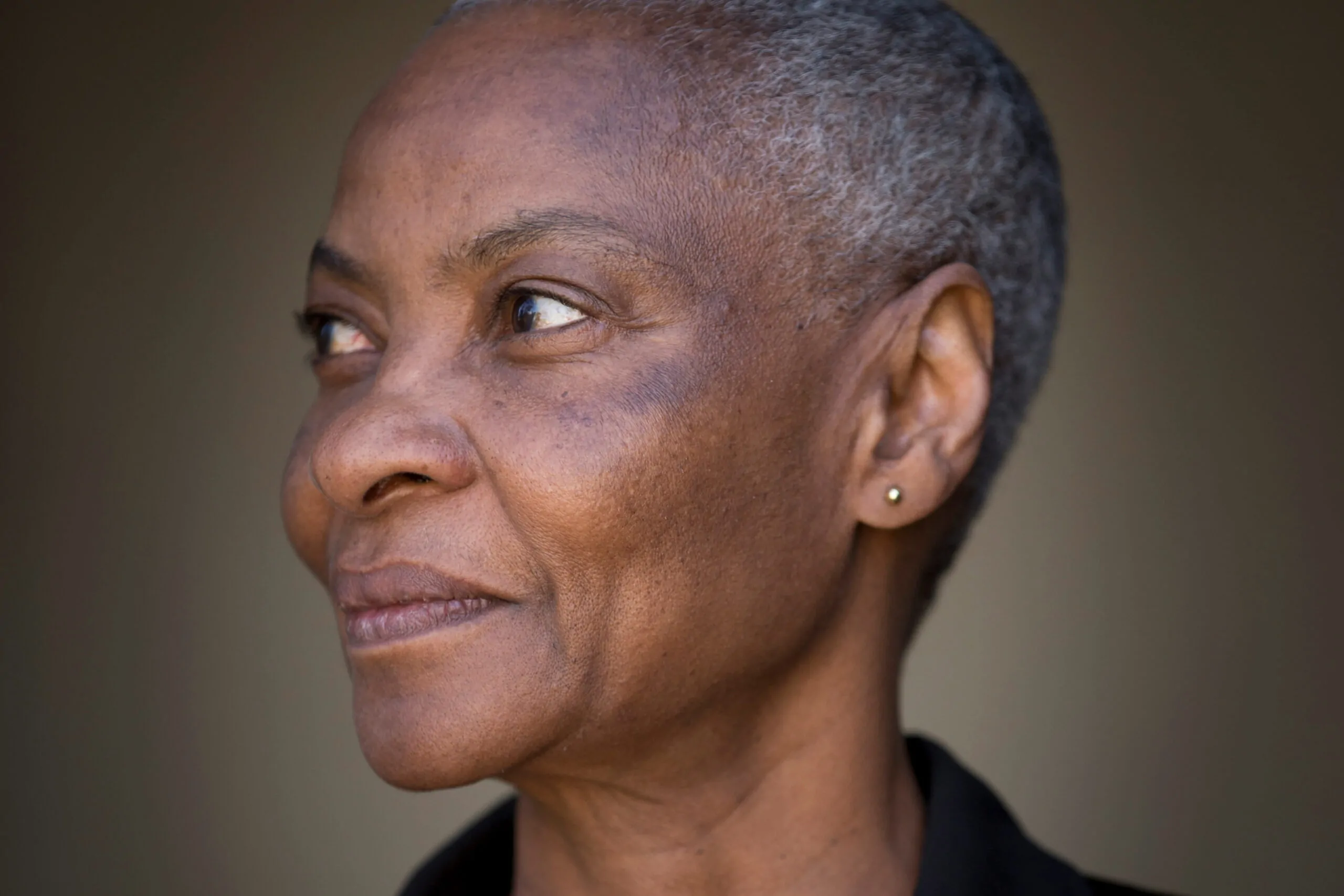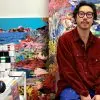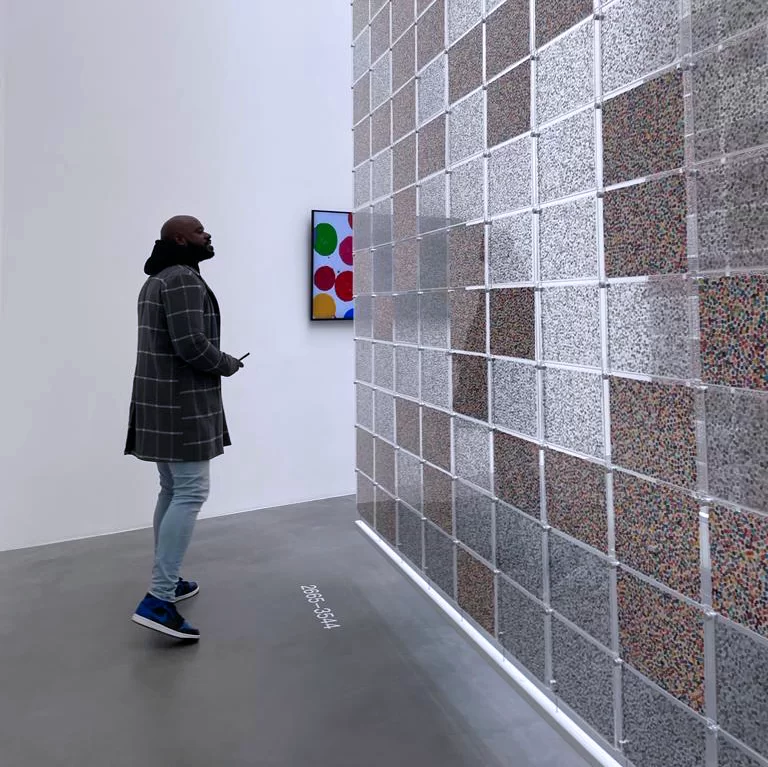Returning after a 25-year hiatus, artist Everlyn Nicodemus steps back into the spotlight with an empowering retrospective at the National Galleries Scotland: Modern One this October, presenting a superior body of work encompassing 40 years of artistic practice.
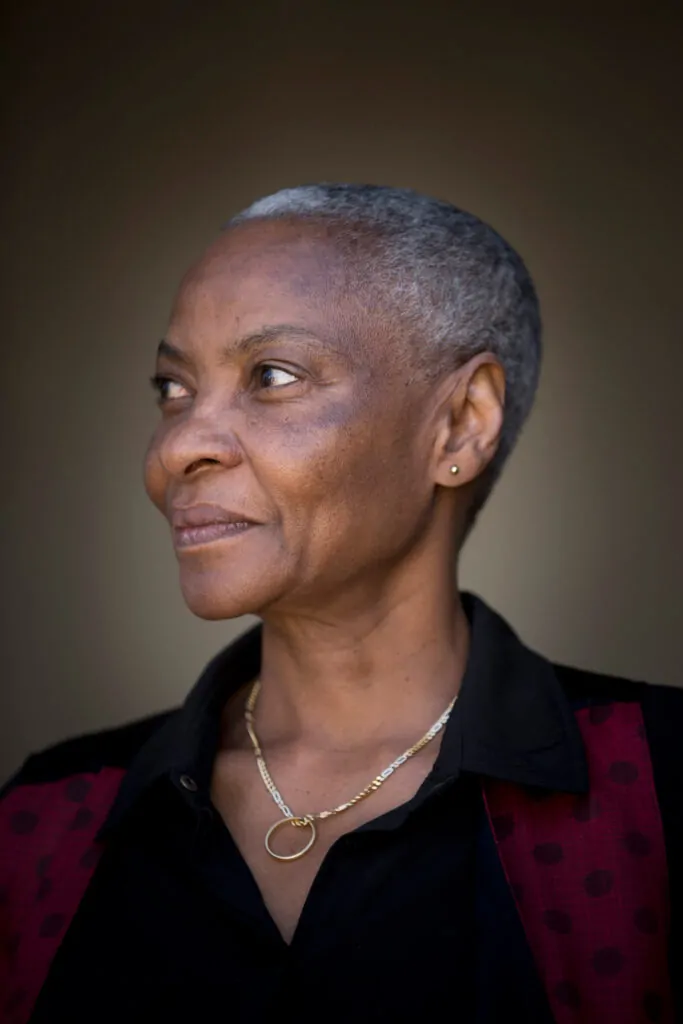
Photo by Joyce Marshall
My generation could achieve and was capable of achieving whatever our dreams desired. I classify myself as the proud product of The African Independence Generation. THE NEW AFRICANS.
Everlyn Nicodemus
Since the mid-1970s, Nicodemus has lived a nomadic lifestyle, experiencing the spice of life through various stints across Europe. Born in Tanzania in 1954, she has called the Scottish capital, Edinburgh, home for the last fifteen years. Alongside her visual art, her practice is enriched by her work as a writer and curator, creating a glorious dialogue of exchange between disciplines.
Nicodemus didn’t become a curator by choice but by necessity. In her own words: “I had to curate myself. No one else offered to. I gave myself a VOICE when I was denied one. No mystery to it. When you’re denied a VOICE, a SPACE, a PLATFORM, you make your own. You Create and Curate.”
For Nicodemus, art has always been a form of healing—a way to process, recover, and reassemble what’s been broken, unspoken, or avoided. She sees art as a vessel of revival, an almost divine act of resurrection.
Since the 1980s, she has challenged the marginalisation of women, structural racism, and oppression. Through a potent blend of painting, collage, and textiles, her work employs materials like burlap and jute for their raw tactility and symbolic weight.
Technically and conceptually, Nicodemus’ approach is as fearless as her subject matter—poetic and honest, where abstraction and figuration meet through gestural brushwork. Her palette is a counterpoint to the strength of her themes, a deliberate choice, allowing the work to sink deep without overwhelming.
Nicodemus navigates the fine line between the weight of history and the potential for healing—both individual and collective. Her new series, Lazarus Jacaranda, is the centrepiece of this retrospective, marking her return to painting after a 25-year hiatus. While the name hints at resurrection, the series delves deeper, reflecting on the cycles of life and Nicodemus’ belief in art’s power to resurrect lost narratives. The exhibition also featured her very first painting, After the Birth, which was created in 1980.
Throughout her career, Nicodemus has been deeply involved in community life, highlighting the shared struggles of women and fostering crucial conversations around modern African art and trauma studies. In 2022, she received the Freelands Award, an annual prize that celebrates underrepresented women artists—a critical factor in bringing this retrospective to fruition.
Nicodemus‘ work offers a critical response to socio-political realities, marginalisation, and the psychological scars left by histories of oppression and trauma. It is neither sentimental nor purely autobiographical. It’s a broader discourse on these effects and the potential for recovery and rebirth through art. Nicodemus’ navigation of these complex spaces has defined her as one of the most poignant voices in contemporary art.
Everlyn Nicodemus is open from the 19th of October, 2024, until the 25th of May, 2025 at National Galleries Scotland: Modern One
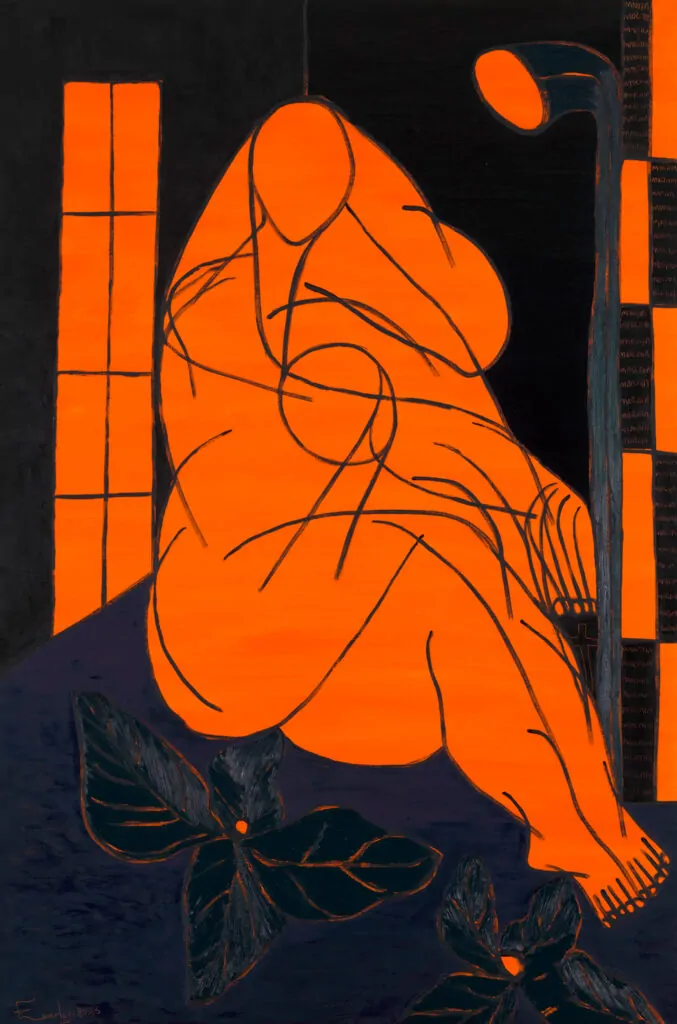
Hi Everlyn, thank you for joining us. To start, could you share your journey into the arts?
Everlyn Nicodemus: I am not sure I can answer the question. I was not born and raised in a traditional African artistic family or clan. Nor was the Arts given priority. The Arts were not totally Ignored, but the Arts was never a priority! Our Lutheran Christian Communities was Progressive one.
Seeking to modernise and advance our communities through education, science and technology. The Arts were not subjects that were promoted in my formative years! I was born 1954 MARANGU Kilimanjaro Tanzania a few years before Tanzania became Independent.
The Mid fifties was the beginning of the death of colonialism on The African Continent. Have that in mind. I am a product of the aspiring generations freed from colonial oppression. We were inspired to think Black African people were equal and not inferior to anyone! We were capable of achieving anything.
My generation could achieve and was capable of achieving whatever our dreams desired. I classify myself as the proud product of The African Independence Generation. THE NEW AFRICANS.
The new Independent African Nations wanted to foster a new educated progressive African Generations. I benefited from that! I was the generation of HOPE. The liberated New African Nations, desperately needed African Doctors, Nurses, Engineers,Teachers, etc Important professionals to run the New Independent African Nations. Arts was not given priority if they were not popular Arts…African Modernists were not popular.
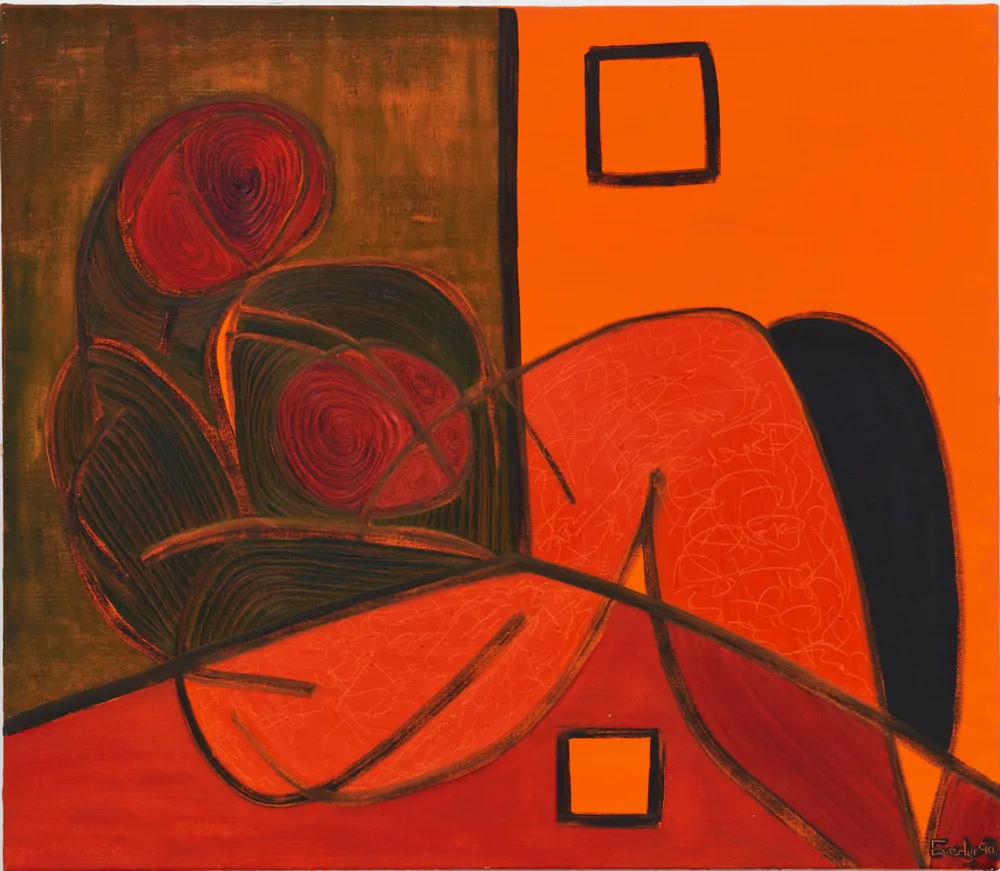
Copyright the Artist, Courtesy Richard Saltoun Gallery
London, Rome & New York
Were there any pivotal moments or influential experiences that led you to pursue a career as an artist?
Everlyn Nicodemus: I can’t define the pivotal moments. I just don’t work like that in my creations. I don’t classify pivotal moments. Arts found me, and I discovered Arts. We fell in love.
You’ve lived in several European countries, each with its own unique cultural landscape. How have these diverse environments shaped your artistic expression and theoretical frameworks? Specifically, how have your experiences with diaspora, racism, and being a woman influenced your exploration of power dynamics in cross-cultural exchanges?
Everlyn Nicodemus: Every country I have visited or lived in has inspired and gifted me in one form or another. There is so much beauty and similarities in humanity. I count myself very fortunate and lucky to have experienced this nomadic lifestyle. No humans are an Island. It’s a gift and Blessing rather than the curse.
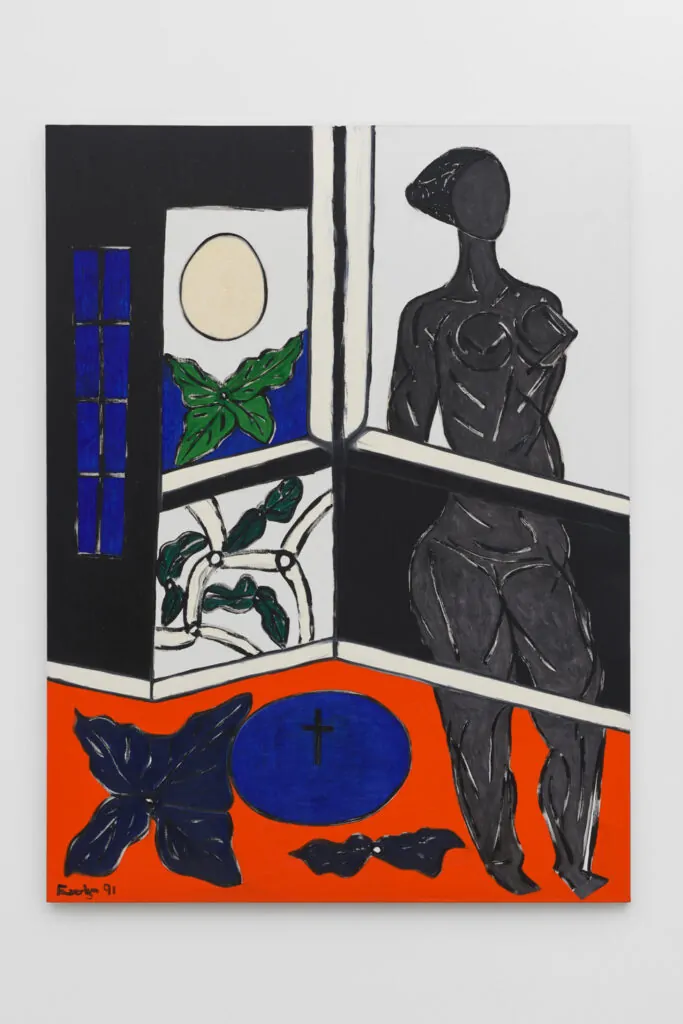
Copyright the Artist,
Courtesy Richard Saltoun Gallery London, Rome & New York
Your work frequently highlights the historical and ongoing marginalization of women. How do you incorporate feminist theory into your visual and written works? Are there specific feminist critiques or perspectives that you aim to bring forward through your art?
Everlyn Nicodemus: Marginalisation of women in Patriarchal societies is a Global Problem since time immemorial. But, We must always remember! Women all over the world has Always fought against Patriarchal oppression.
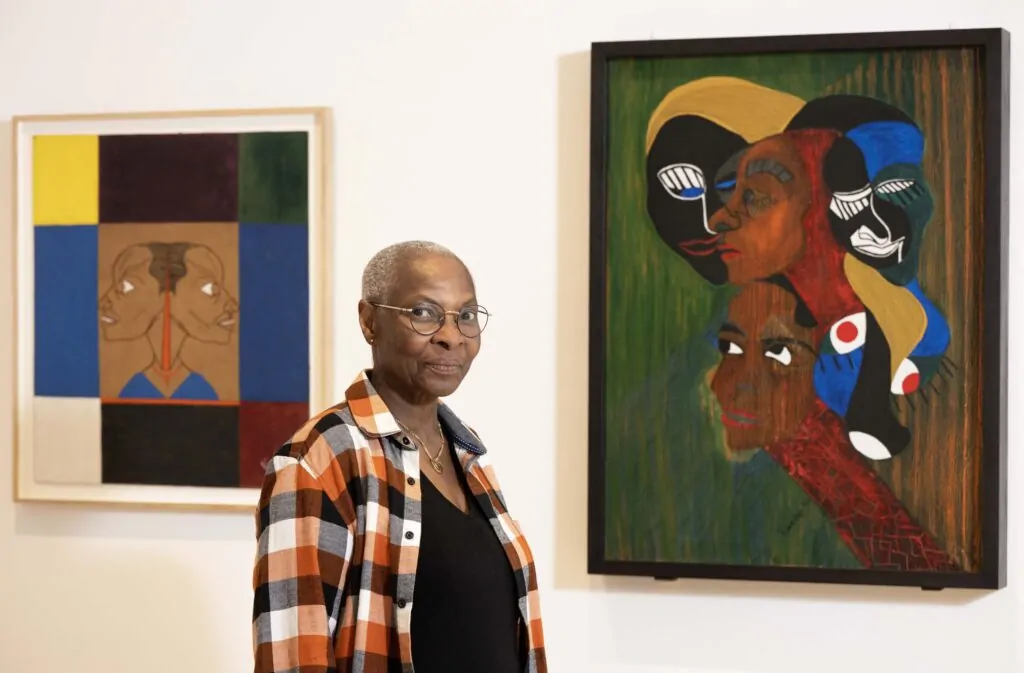
Maybe be? But not consciously. I read a lot of books about global women’s Histories, including feminist theories and Art theories etc. If some of my theories readings sneaks into my creations? I don’t mind at all!
In addition to creating art, you’ve engaged in curatorial practice, particularly examining themes of trauma and suffering. Can we discuss your curatorial approach? What do you view as the curator’s responsibilities when representing such sensitive topics?
Everlyn Nicodemus: My curatorial practice was born out of necessity. I have to curate myself as no one offered to curate me. I gave myself a VOICE when I was denied a VOICE. No mystery. If, you’re denied a VOICE a SPACE a FORUM you resort to Create and Curate.
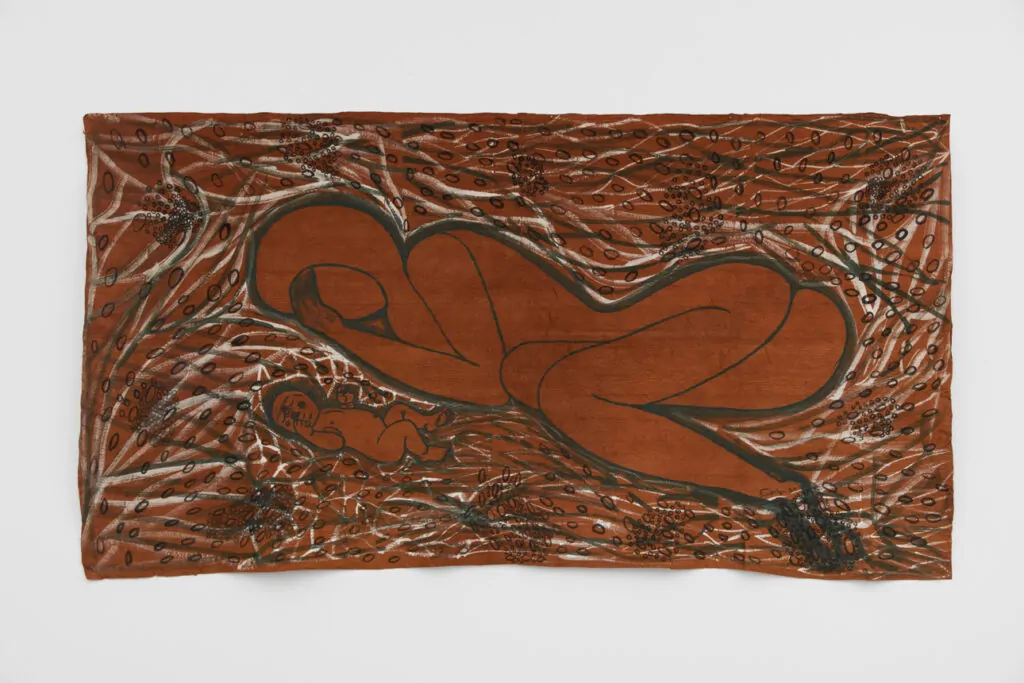
Copyright the Artist,
Courtesy Richard Saltoun Gallery London, Rome & New York
Your PhD research on ‘African Modern Art and Black Cultural Trauma’ intersects closely with your artistic practice. How do you integrate your academic research with your creative work? Could you provide an example where this synthesis is particularly evident?
Everlyn Nicodemus: Correct. it intersects with my artistic practice. It was again a product of necessity. Denied a VOICE? I gave myself a VOICE.
©2024 Everlyn Nicodemus


